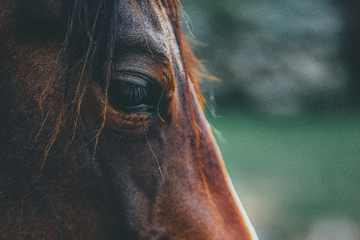Spring is here and just like us, horses can suffer from allergies too. Allergies are an abnormal reaction to foreign substances (allergens) by the immune system to which it has become hypersensitive. Horses often live in environments that have a high level of dust, mold, or other common allergies in the air. While horses’ immunes systems normally provide protection for themselves, the immune system of some horses overreacts to the presence of one or more airborne allergies.

The most common types of allergic reactions in horses show up in the skin or respiratory system. In the skin, you may notice your horse itching an area or breakout with hives. For a respiratory reaction, your horse may begin coughing, sneezing, or wheezing, but without nasal discharge.
Allergies have several potential causes and are categorized into four general categories:
- Insect hypersensitivity
- Contact allergies
- Inherited atopy (respiratory)
- Food allergies
Common horse allergy symptoms include:
- Hives
- Itchy skin or irritated skin
- Respiratory problems such as coughing or wheezing
- Constant headshaking
- Hair loss
- Increased breathing rate
Allergies are not common in horses, but when they do occur, early intervention can help keep a small problem from becoming a major health issue. That is why it is important to learn the most common causes of allergic reactions, the signs they produce and the most effective treatments.
The main way to prevent allergic reactions in horses is to avoid exposing them to their known allergens. The only way of preventing an allergic reaction is to separate the horse from the allergen. This may be easier said than done, as it may take extensive or expensive testing to find out what exactly is causing the allergic reaction. Once the allergen source is recognized, you must either remove the source or move the horse to another location where the allergen is no longer present. For horses with severe, unavoidable allergies your vet should be able to provide you with medications to combat the symptoms





















